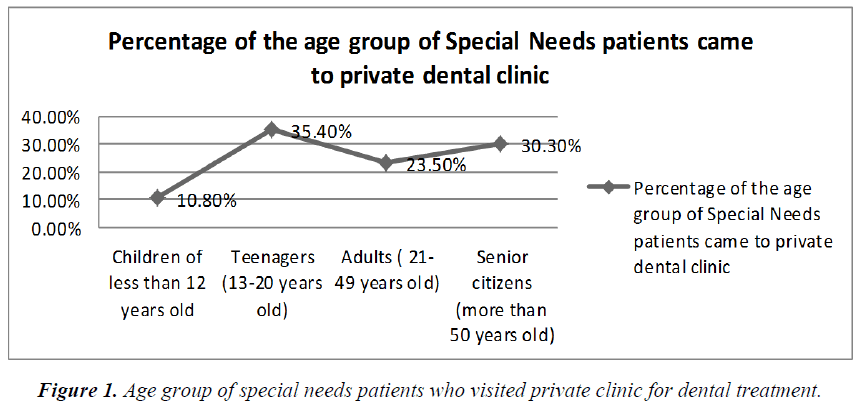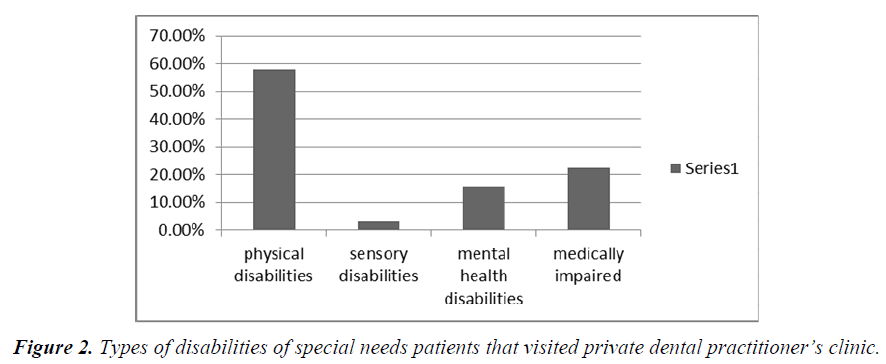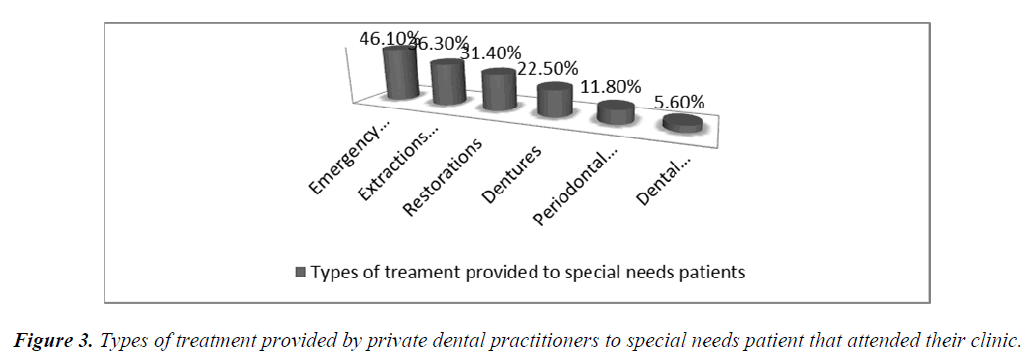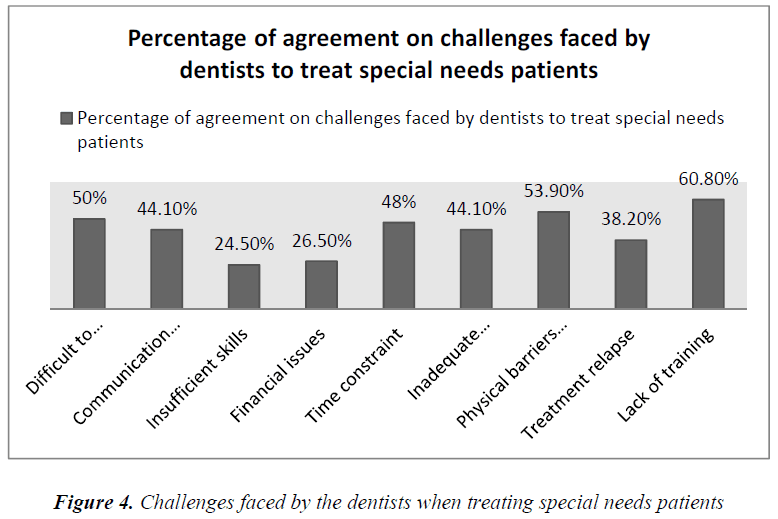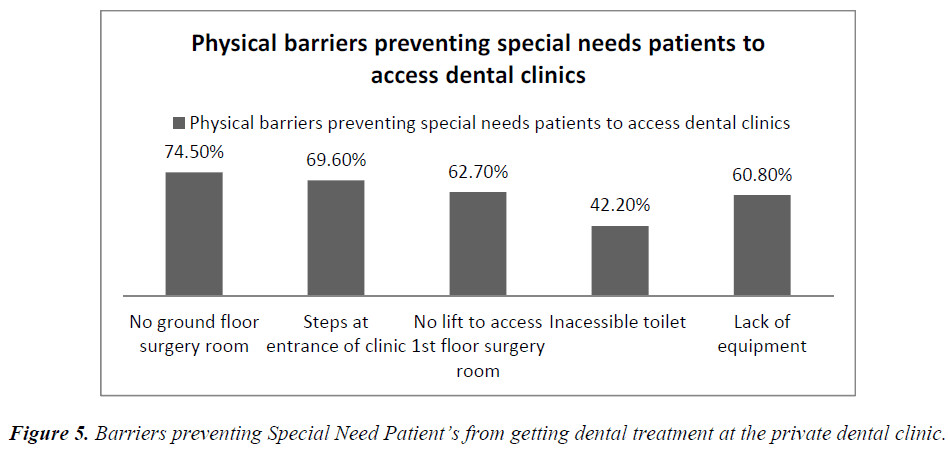- Biomedical Research (2015) Volume 26, Issue 1
Dental Treatment and Special Needs Patients (SNPs): Dentist?s Point of View in Selected Cities of Malaysia.
Priyadarshni Bindal1*, Chai Wen Lin1, Umesh Bindal2, Sher Zaman Safi3, , Zahidah Zainuddin1 and Andreas Lionel11Department of Conservative Dentistry, Faculty of Dentistry, University of Malaya, 50603 Kuala Lumpur, Malaysia
2Department of medicine, School of Medicine, Taylor's University, Kuala Lumpur, Malaysia
3Department of Medicine, Faculty of Medicine, University of Malaya, 50603 Kuala Lumpur, Malaysia
- *Corresponding Author:
- Priyadarshni Bindal
Faculty of Dentistry, University of Malaya
50603 Kuala Lumpur, Malaysia
Accepted date: November 04 2014
Abstract
This study was aimed to investigate the perception of dental practitioners in Malaysia regarding the treatment needs and the hitches clinicians face in providing dental care to Special Needs Patients (SNPs) including the challenges faced by them. Self-administered survey forms were distributed to 150 randomly selected private dentists in Malaysia. The survey consists of 16 questions where 13 were close-ended questions and 3 were open-ended questions. The data were analysed using SPSS software version 12.0. Response rate was 68%. 81.4% of the dentists stated that they are willing to treat SNPS and mostly provide emergency treatment, extractions and restorations to SNPs. 87.2% of the dentists encountered less than 5 SNPs within a period of one month, and only 2% of dentists had seen more than 11 patients. 63.7% of dentists were not aware of the act for persons with disabilities. Dentists identified behavioural management, insufficient skills, lack of training, financial issues, time constraint, physical barriers, inadequate referral facilities, inadequate exposure during undergraduate studies and insufficient financial reimbursement were the main barriers to provide dental care to SNPs. Most of the dentists agreed that no ground floor surgery, steps at clinic entrance, no lift to access 1st floor clinic, and lack of equipment as the physical barriers for SNPs to access their clinic. Our results conclude that the training acquired by dentists in special needs dentistry should be enhanced to provide comprehensive dental care to SNPs.
Keywords
Special needs patients , dentistry, oral health, private practitioners, Malaysia
Introduction
Special Needs Dentistry can be defined as a branch of dentistry that deals with the oral health and related problems of individuals severely affected by physical or intellectual disability or by profound psychiatric or complex medical issues [1]. This division of dentistry can be considered as one of the new and emerging speciality of dental profession. In this fast moving era, we tend to just look by this small percentage of people in the community who need just a little more attention and care compared to other individuals.
Malaysia consists of a population of 26.64 million and the registered number of disabled individuals were 1,97,519 as of year 2006, based on Department of Social Welfare’s statistical report [2,3]. Patient management is a very important factor to emphasize on with while providing dental care to special needs patients (SNP’s). In order to provide comprehensive care to such patients, further expertise is required in this field. Speciality training programs in special needs dentistry enable trainees to advance their knowledge, attitude, and patient management skills to meet the oral health needs of this group of patients.
In general, SNPs have poor oral hygiene due to underlying disability or sometimes as a side effect of certain medications. This group of people are generally unaware of the need to seek dental care [4]. Therefore, appropriate treatment and care should be provided as early as possible to prevent the progress of oral diseases that might later require complex treatment procedures. Due to certain obstacles like insufficient behavioural management skills and lack of training in the field, most dental professionals are not willing to provide treatment to this group of patients [5]. Special needs patients in majority seek dental treatment for remedial procedures compared to preventive procedures. Based on a study conducted by Smith et al. [4], treatment provided by dental practitioners on special needs patients showed more than 70% for emergency services and extraction.
Oral health needs and special needs patients.
This study was carried out to explore the view of the private dental practitioners in Malaysia regarding the provision of oral health care to special needs patients. Present study also aims to get a reflection of the current treatment protocol for special needs patients, followed by private dental practitioners. This study is anticipated to provide information relevant for development of future curriculum essential for development of holistic dental professionals that are able to provide comprehensive care to special needs patients.
Materials and Methods
Ethical approval
Study was approved by the Medical Ethical Committee, Faculty of Dentistry, University of Malaya.
Study instrument and population
The survey instrument was a self-administered and validated questionnaire consisting of 16 questions (13 close-ended and 3 open-ended questions). Questionnaire distributed among 150 private dentists in Kuala Lumpur, Penang and Kuching. The validity of questionnaire was confirmed with similar articles with some modifications and with the help of our supervisors.
Statistical analysis
The data were analysed with statistical software SPSS version 12.0. The results are being presented in percentage frequencies and charts.
Results
Response rate of survey was 68% (out of 150 survey forms distributed, 102 were returned). Data reflected a high percentage of dentists (81.4%) were willing to treat patients with special needs. 87.2% of the dentists encountered less than 5 special needs patients within a month time, 10.8% of dentists scanned, 6 to 10 patients and only 2% of dentists scanned more than 11 patients. Among all the private dental practitioners surveyed, only one dentist was found to have specialized training in this field.
A large number of the private dental practitioners (63.7%) were unaware of the “act for the people with disabilities” which has been stated in the Laws of Malaysia.
Most of the special needs patients that attended for dental treatment were teenagers (35.4%), followed by senior citizens (30.3%), adults (23.5%) and only 10.8% for children of less than 12 years old (Figure 1). Percentage of the types of disabilities is shown in Figure 2.
Majority of the dentists (46.10%) informed that they provided emergency treatment followed by extractions (36.30%), restorative treatment (31.40%), dentures (22.50%), periodontal treatment (11.80%) and dental screening (5.60%) as shown in figure 3.
When asked on the challenges faced while treating special needs patients, majority of them having difficulty in managing patient’s behaviour (50%), communication with patients (44.1%), time constraint (48%), inadequate referral facilities (44.1%), lack of training (60.8%) and physical barriers to access their clinics (53.9%). Most of the dentists did not provide any opinion regarding, insufficient skill (56.9%), dental treatment relapse (48%), and financial issues (57.8%).
As per the dentists barriers in receiving dental treatment by SNPs were, no ground floor surgery room (74.5%), steps at the clinic entrance (69.6%), no lift to access 1st floor surgery room (62.7%), inaccessible toilets for wheelchair users (42.2%), and lack of suitable equipment (60.8%) were the main barriers that prevent patients with special needs from getting dental treatment in their dental premise. 65.7% of the private practitioners used anaesthesia to achieve behaviour management of special needs patients. Small percentage of dentists (2.9%) used conscious sedation, while 31.4% utilize other behaviour management that were not specified. 77.5% of the dentists agreed that financial reimbursement is one of the reasons that hinder them from providing dental care towards this group of patient. A large number of them (81.4%) also agreed that they did not have adequate exposure during their undergraduate studies regarding special needs dentistry. When asked on their interest to pursue further training in managing patients with special needs, only 34.3% of the dentists presented willingness.
Discussion
Present study shows that more than half of the dentists in our survey population considered ,dental treatment to SNPs challenging, similar to the findings of study done by Muller in US in the year 1998 [6]. While the dentist are prepared just to provide treatment at initial stage, study shows that general dental practitioners should be trained during undergraduate studies and should be encouraged to attend continuing dental education programme so that they can manage SNPs in a comprehensive manner. Despite lack of training and other obstacles that dentists face while providing dental treatment to these patients, dental practitioners are willing to treat SNPs even though 87.2% of them see less than 5 Special needs patients in their clinic within a month time. A low number of SNPs attending general dental clinic might be due to barriers like physical barriers to access dental premises.
It is stated in Laws of Malaysia, Persons with Disabilities Act 2008 (Act 685), that persons with disabilities should have equal rights to access healthcare services as persons without disabilities [7]. Low awareness among majority of our respondents regarding this act reflects the lack of exposure during undergraduate training. The requirements embodied in this disability act should be promoted among the dental professionals starting from undergraduate level. A small portion of the dentists treat children less than 12 years old that has disabilities. Casamassimo [8] stated that only 10% of dentists often examined children with special needs. Dentists revealed that highest percentages of SNPs that seek dental treatment in their clinics are the teenagers (35.4%). Followed by physical disabilities, medically impaired patients, mental health disabilities and least seen patients are those with sensory disabilities. The most commonly reported treatments carried out on SNPs include emergency services, extractions and basic restorative care. A study on Irish dentists by Smith et al. [4] also reported that these three types of treatments are commonly provided by the dentists to SNPs. Oral hygiene instruction and preventive dental care was found minimal with a percentage of 5.6%. Dental treatments that require multiple visits and follow ups such as periodontal treatment and denture fabrication are rarely performed by the dentists to SNPs compared to single visit treatments (e.g. emergency, extraction, and restorative treatment). The high prevalence of poor oral health in SNPs directly underlines the significance of preventive strategies to be undertaken during the treatment of SNPs.
The problem of lack of time to treat disabled patients reported in this study has been reported before by Nunn and Murray in the year 1998 [9]. One of the results in present study showed that more treatment time required to treat these patients might be one of the reasons for not providing adequate care to this population, where time limitation also has been agreed by almost half of the surveyed dentists (48%) as a challenging factor in providing dental care to SNPs.
This observation is similar to the one stated by Waldman and Perlman [10] in their study done in year 2010.
Treatment relapse is also one of the challenges faced by the dentist in treating SNPs with a percentage of 38.2%. This is a direct result of inability in oral hygiene maintenance of these patients.
A survey by dentists in Nigeria suggested that learning of appropriate interpersonal communication skills is a crucial entity of health care professionals [11].
From our survey, 24.5% of the dentists revealed that lack of clinical skills contributes to the challenges while treating SNPs. This can also be due to the insufficient training during undergraduate course. Half of the dentists (50%) agreed that behavioural management is a major challenge in treating SNPs. Girdler and Hill [12] stated that a successful treatment for these patients depends on the dentist’s ability to manage the patient with appropriate behaviour management techniques as cooperation is often lacking in individuals with severe disability.
Salama et al. [5] stated that improving the financial reimbursement is one of the core issues in providing treatment to these special needs patients. This study has statistically shown similar results with our survey where majority of the private practitioners think that insufficient financial reimbursement is the major reason for not providing services to most of this group of patients. Present data shows, majority of dentists relied mainly upon anaesthesia with a percentage of 65.7% as the adjunct for behavioural management compared to conscious sedation (2.9%). While 31.4% stated that they used other adjuncts, however this type of modalities used arte not specified.
Training programmes in special needs dentistry could be carried out to enhance and improve the quality of patient care as well as providing a training pathway to encourage dentists interested in this field of dentistry to pursue their interest. It is strongly agreed that difficulty in effective communication is a major barrier in treating SNPs.
Conclusion
The findings in our survey presented that maximum private dentists are willing to treat special needs patients despite the challenges they faced. Minimizing the physical and financial barriers is essential to provide compulsive care to this group of patients.
References
- Gallagher JE, Fiske J. Special Care Dentistry: A professional challenge. Brit Dental J 2007; 202: 619-629.
- Department of Social Welfare (2006). Rehabilitation Centre for the Orthopaedically Handicapped. Centre, Kuala Lumpur: Legaland Advocacy Division 2006.
- Kamarulzaman K. Adult Learning for People with Disabilities in Malaysia: Provisions and Services. J Human Resource and Adult Learning 2007; 3: 50-64.
- Smith G, Rooney Y, Nunn J. Provision of dental care for special care patients: the view of Irish dentists in the Republic of Ireland. J Irish Dental Assoc 2010; 56: 80-84.
- Salama FS, Kebriaei A, Durham T. Oral Care for Special Needs Patients: A Survey of Nebraska General Dentists. Paediatric Dentistry 2011; 33: 409-414.
- Mueller CD, Schur CL, Paramore LC. Access to dental care in the United States. J Am Dent Assoc 1998; 129: 429-437.
- Laws of Malaysia. Act 685 Person With Disabilities Act. Malaysia. Percetakan Nasional Malaysia Berhad; 2008.
- Casamassimo P, Seale N, Ruehs K. General dentists' perceptions of educational and treatment issues affecting access to care for children with special health care needs. Journal of Dental Education 2004; 68(1): 23-28.
- Nunn JH, Murray JJ. Dental care of handicapped children by general dental practitioners. Journal of Dental Health Education 1998; 52: 463-465
- Waldman HB, Perlman SP. Generally speaking, dentists can’t/will not treat patients with disabilities. Dental Hypotheses 2010; 1: 51-58.
- Folakemi A Oredugba Oluwatosin O Sanu. Knowledge and behaviour of Nigerian dentists concerning the treatment of children with special needs. BMC Oral Health 2006; 6(9): 1472-6831.
- Girdler NM, Hill CM. Spectrum of patient management. In: Sedation in Dentistry. Oxford. Butterworth-Heinemann 1998; p3.
